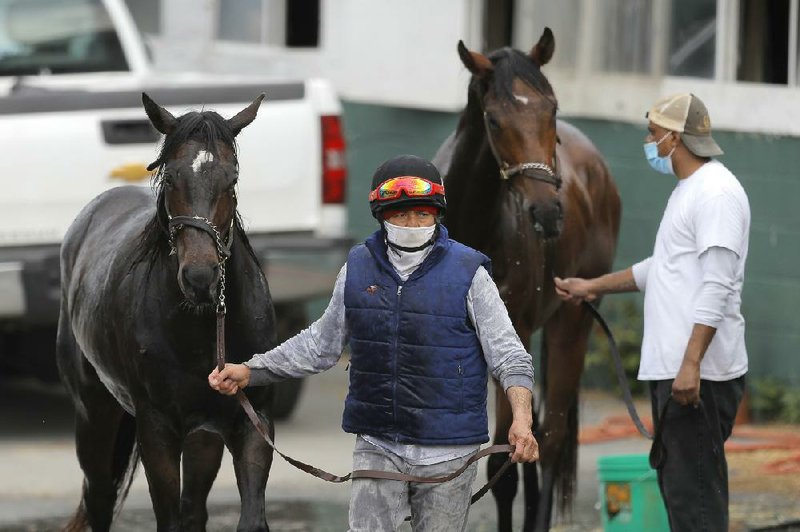Instead of the Preakness running today in Baltimore for the second jewel of the Triple Crown, horse racing is in the midst of transition.
And lower- and middle-class owners are in the cross hairs.
Owner Maggi Moss was concerned about the fate of the little guys before the coronavirus pandemic derailed the sport. Now, she worries her fears have become a reality.
"We have an industry that's going to come back looking very different," Moss said. "Maybe I'm wrong, but there's many people that can't afford this anymore."
[CORONAVIRUS: Click here for our complete coverage » arkansasonline.com/coronavirus]
But all is not lost.
While a vast majority of North American thoroughbred tracks remain dark, Churchill Downs and Santa Anita Park are set to resume racing without fans, following the lead of Oaklawn Racing Casino Resort in Hot Springs from March through the end of its regular meeting May 2.
Others are set to follow in what could be a lifeline for owners and trainers with smaller barns who have been suffering without steady income.
"We're seeing the light at the end of the tunnel, hopefully," Maryland-based owner and trainer Linda Gaudet said from Louisville, Ky., where she's preparing for racing to return today at Churchill Downs. "The owners and the trainers and the riders, they need to get back to work, make a living."
A mix of government restrictions and positive coronavirus results stopped racing in Kentucky, Maryland, New York, California and elsewhere in March, and Gaudet said "it's been a long two months." Racing without fans continued only at a handful of tracks, including Gulfstream Park and Tampa Bay Downs in Florida and Oaklawn.
Trainer Norm Casse recently said from Florida that as long as some tracks are running, he's able to keep his operation going.
"I don't think there's probably an industry in the country that's not affected by this in some way, shape or form," Casse said. "You take comfort in the fact that you know you're not alone, that everybody's going to be making sacrifices. Everybody probably stands to lose a little something from all of this, and just be grateful to be in the position we were in to begin with."
Some are in better position than others.
Deep-pocketed owners and big-time trainers such as two-time Triple Crown winner Bob Baffert can handle the reduction in racing. It's more concerning for the small businesses throughout the industry, from owners and trainers to jockeys, grooms and other employees.
"Those businesses don't have the financial flexibility, perhaps the cash reserves, to weather this storm for longer than a month or two," National Thoroughbred Racing Association President and CEO Alex Waldrop said. "If this extends past May into June or July, you're going to see attrition."
The NTRA has encouraged horsemen to apply for federal and state government aid, which Gaudet did, calling it "something that will keep the business afloat until we get back to racing."
The Jockey Club Safety Net Foundation also provided assistance by feeding backstretch workers living and working at eight U.S. tracks.
"What's unique about horse racing is they have to continue to train these horses and care for these horses even if there isn't live racing, so right now a lot of these people are still working," Jockey Club Safety Net executive director Shannon Kelly said.
"We identified that the backstretch community is in the most need right now with a lot of racetracks no longer having live racing. That puts the backstretch community in a difficult financial situation."
That difficulty remains in many places until the return of live racing, which the NTRA is hoping can happen through the implementation of health and safety protocols. One of Gaudet's daughters, Lacey, put procedures in place at Laurel Park in Maryland before it shut down, adding masks, gloves and sanitizer to her daily operations.
Those are extra expenses, but they pale in comparison to the money lost in taking care of horses and not being able to recoup any of it on the track.
"The only way we make money is racing," Linda Gaudet said. "These horses are expensive to carry, and when there's no income coming in, it hurts everyone, especially the smaller trainers."
Sports on 05/16/2020
